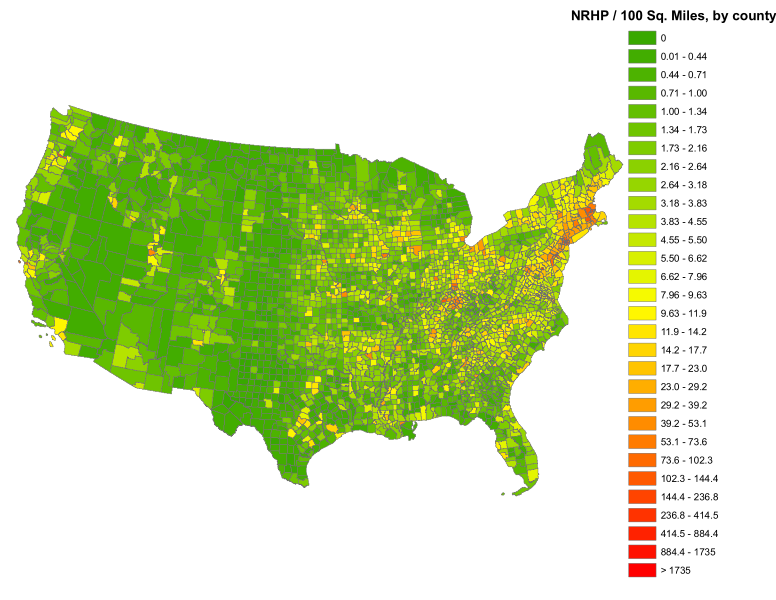Reimagining the National Register Nomination Form
May 17th, 2010 | eli
I propose a discussion of the National Register of Historic Places nomination form to reimagine the potential of historical research and documentation in the context of abundance of digital tools for the investigation and presentation of architectural and social history. The National Register nomination form dates back to the enactment of the National Historic Preservation Act of 1966 and continues to reflect the technical limitations and, arguably, the ideological assumptions of architectural history during the 1960s. The rise of vernacular architecture and cultural landscape studies have directly challenged the tradition of engaging buildings and neighborhoods with a curatorial approach based in an art history. Questions of style, significance, context, and integrity are now contested and complicated in ways that may be poorly reflected within the limits laid out in National Register Bulletin 16A “How to Complete The National Register Nomination Form.” Beyond the scholarly transformation of architectural and social history, the existing form has been disrupted by the transition from a culture of of scarcity to a culture of abundance described by Roy Rozenweig. The capacity to conduct full-text searches of manuscript census documents across hundreds of years with Ancestry.com, browse dozens of digitized directories on the Internet Archive, download measured drawings or archival photos from a good portion of HABS/HAER, determine the extant status of buildings using Google Maps, create three-dimensional models with Photosynth, and manage nearly unlimited sources with Zotero must force a radical reconsideration of the process of object of local history research and documentation. None of this was possible in 1966. If we started from scratch today, what would the National Register nomination form look like?
I believe this question presents an opportunity to address engage with broader interests in linked data, social media, multimedia digital scholarship, geospatial data in the humanities, expanding scholarship to non-academic audiences, and the long-term preservation of digital work. To start here are a few specific examples of the limits and potential alternatives to the National Register nomination form,
- The existing nomination form is largely textual, including a detailed written architectural descriptions. Could the supplementary documentation a National Register nomination include digital audio and video recordings of oral histories or historic events? 3D models of viewsheds? Datasets on demographic change at a block or neighborhood level?
- The existing nomination form is clearly limited to a single author. How can attribution for collaborative authorship be addressed? Can a nomination be crowdsourced? How can alternate voices be integrated into the narrative? (CommentPress?)
- The existing nomination form provides some structured data but it does not use a controlled vocabulary and fails to capture to dozens of references to building and architects found in the historic context of the nomination. Can nominations be linked together with URIs that might represent architects, builders, owners, and buildings? (NC Architects & Builders?) Can unstructured natural language description be converted into semantic data? (OpenCalais?)
- The existing nomination form provides a heading at the end of the form for a brief bibliography. Can RDF data be embedded in the nomination? Can references be linked directly to primary sources? (Document Cloud?)
While my proposal for THATCamp Columbus provided a number of examples for historic places databases, a few more inspirational examples include NYC Landmarks, PhilaPlace (also addressed in Mark Tebeau’s session from Columbus), Wikipedia Saves Public Art, and the Brooklyn Typology. Admittedly the National Register has started digitizing and sharing images on Flickr and expanding access to past National Register Nomination forms through the much improved NPS Focus database but basic issues with the format of the nomination still remain. This post is a bit of a departure from my initial proposal but I hope it clearly engages with my stated interest in non-academic and non-scholarly audiences (and is not too link heavy to read). I think there may be a few interesting intersections with the proposal from Megan Brett and I’m particularly curious for any suggestions from Chad Black, Priya Chhaya, Karin Dalziel, and Matt Thomas.


May 22nd, 2010 at 10:56 pm
[…] publishing a very specific proposal on the National Register nomination form a few days ago and then writing a whole new title up on the whiteboard this morning, I wanted to […]
January 26th, 2011 at 1:59 pm
Just curious: Is there a version of the National Register Nomination Form in some kind of database format, such as MS Access? One that could be used for data entry to create new nominations?